Is SEO Dead in 2025? How to Prepare for SEO’s Future

When you want to find out about products, do you flip through a newspaper or magazine or go straight to an online search?
Marketing has drastically changed, from print ads and newspaper displays to digital pop-ups and email campaigns. In the last few years, search engine optimization (SEO) has been hailed as one of the top marketing strategies.
However, SEO is rapidly evolving. Google’s AI Overviews (AIO) and other AI-driven search technologies are reshaping how users search and how content appears in search results.
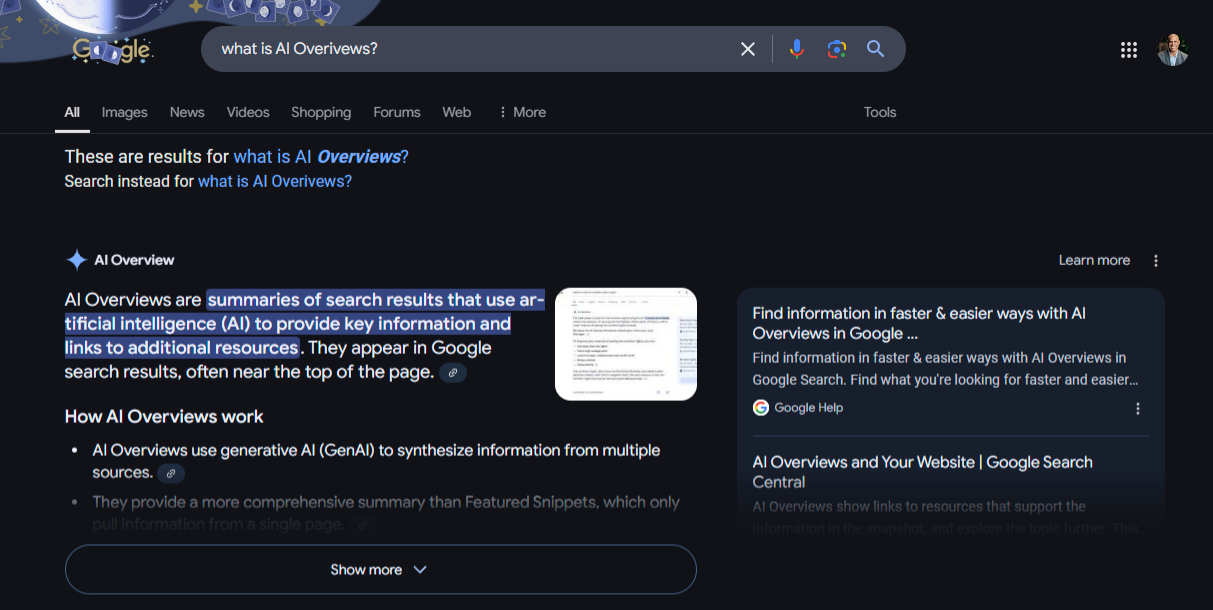
Businesses now integrate AI tools into their SEO workflows to maintain visibility in an increasingly competitive space.
We recently surveyed Databox and found that roughly 64% of businesses already use AI for content generation, while 44% rely on AI for keyword research. This demonstrates the growing role of AI in modern SEO strategies.
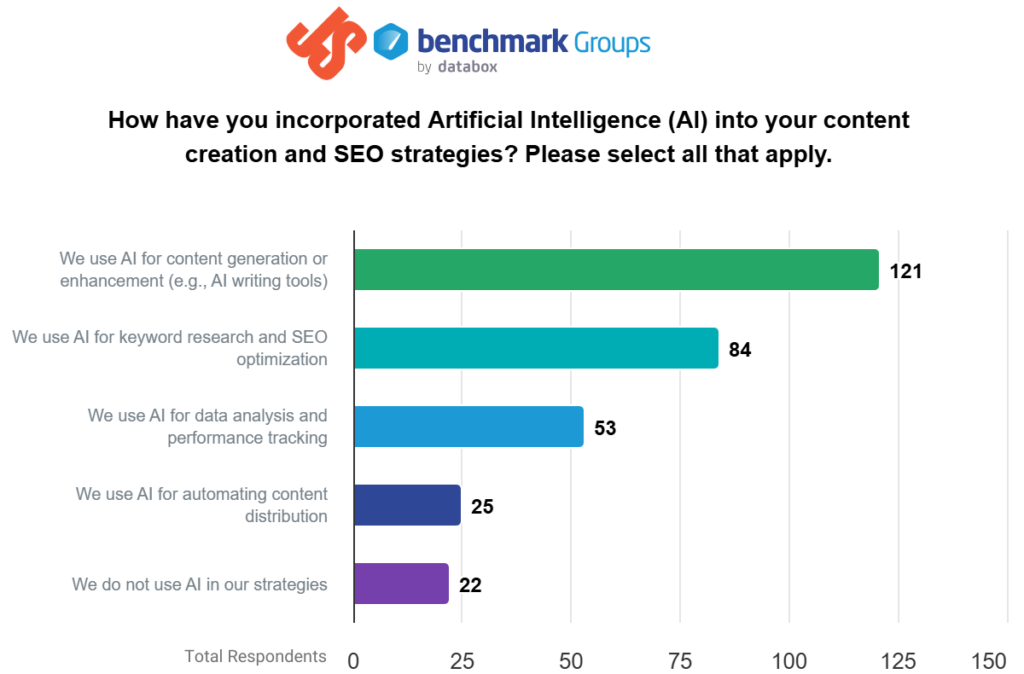
These insights show that businesses leveraging AI in content creation and keyword research are improving efficiency and maintaining a competitive edge. Companies that fail to integrate AI into their workflows risk falling behind competitors that optimize their strategies with automation and data-driven insights.
Is SEO Dead?
The short answer is no.
Search engine optimization relies on three truths to remain relevant:
- Search engines must exist.
- Your audience must use search engines.
- You must be able to influence whether or not your content appears in search results.
If those three factors are true, SEO is alive and thriving. According to another study we conducted alongside Databox, roughly 55% plan to increase their SEO investments in 2025, while only 4% plan to decrease them.

Join the Conversation. Take our survey today!
That said, SEO is evolving, not dying. AI-driven search transforms SEO into Generative Engine Optimization (GEO), a new approach in which businesses must optimize for AI-driven results. With Google’s AIO prioritizing AI-generated summaries — structured content and authoritative sources are now more important than ever.
Understanding customers’ search behaviors has become crucial in this new landscape. Search queries have shifted toward conversational and natural language searches, emphasizing the need for businesses to align content with user intent.
According to our data, 32% of businesses reported a noticeable shift in how users phrase their searches, moving toward conversational queries.
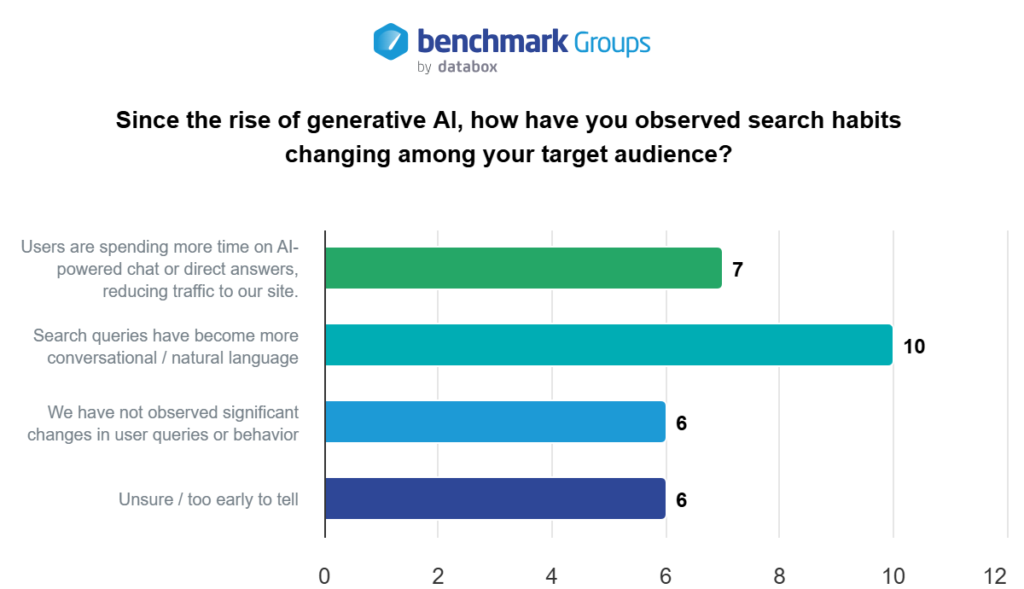
This shows us that AI is reshaping how users search for information. As more individuals engage with AI-powered search tools, businesses must optimize their content for conversational queries and AI-driven responses. The shift toward chat-based search results emphasizes the need for structured, informative content that AI can extract and present directly.
The Evolution of SEO
SEO has shifted from simple keyword optimization to content clusters and topic authority. The pillar-cluster model is emerging as the best approach for ranking in AI-driven search, allowing businesses to establish expertise on broad topics while covering subtopics in detail.
High-quality content remains the foundation of SEO. Google’s E-E-A-T framework (Experience, Expertise, Authoritativeness, and Trustworthiness) is more critical than ever, especially for YMYL (Your Money, Your Life) topics.
To have the possibility of ranking for YMYL topics, you must show Google that you are also a highly respected authority in the field through your expertise, experience, authority, and trust factor. These can come from:
- Positive feedback from satisfied customers
- Quality, smooth-running online experiences and websites
- Unique, insightful content
- Original ideas
- Online bios demonstrating your experience
- Backlinks from respected sites
- Links to high-authority sites
Understanding Search Intent
To effectively optimize for AI-driven search, businesses need to focus on search intent—the reason behind a user’s query. When we say understand your customer, we want you to dig deeper than their pain points and demographics. Look at what drives them to search engines in the first place.
There are four primary types of search intent:
- Informational – Users seek knowledge or answers (e.g., “What is AI-driven SEO?”).
- Navigational – Users want to find a specific website or brand (e.g., “Google Search Console login”).
- Commercial – Users compare options before making a decision (e.g., “Best AI SEO tools 2025”).
- Transactional – Users are ready to take an action, such as making a purchase (e.g., “Buy keyword research software”).
By aligning content with search intent, businesses improve their chances of ranking in AI-generated search results and featured snippets. AI-powered search engines prioritize content that delivers clear, relevant, and authoritative answers to user queries.
Writing for Snippets, AI Overviews, and Creating Authoritative Content
Practicing ethical SEO is crucial in today’s AI-driven search landscape. With Google cracking down on low-quality, mass-produced content, businesses must prioritize strategies emphasizing expertise, authority, and trustworthiness. Instead of chasing quick gains through manipulative tactics, brands should focus on sustainable, user-first approaches that align with search engine guidelines and foster long-term success.
As search engines increasingly integrate AI to enhance user experiences, businesses must refine their content strategies to stay visible. AI-generated overviews and featured snippets provide users with concise, high-value answers, making it essential for brands to structure their content effectively. Optimizing these features can improve search rankings, drive traffic, and establish credibility within an industry.
During our research, we examined AI integration in SEO. We found that businesses are increasingly leveraging AI-driven tools to refine their strategies and maintain a competitive edge in search rankings:
- 65% of businesses use AI-powered content creation to scale and optimize content production.
- 32% of businesses rely on automated keyword research to identify high-performing search queries.
- 23% of businesses use predictive analytics to forecast trends and refine content strategies.
- 42% of businesses leverage AI-driven on-page optimization to improve search engine rankings.
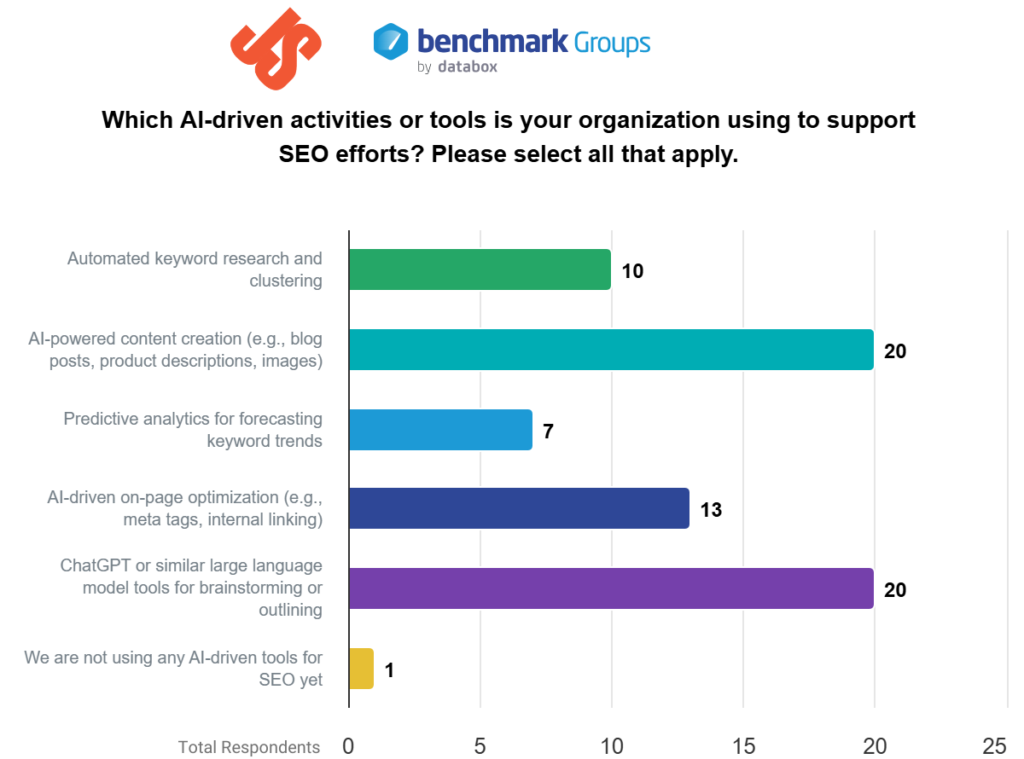
These findings emphasize AI’s growing role in modern SEO. Companies integrating AI-powered strategies streamline workflows, enhance efficiency, and use automation to produce high-quality, optimized content. Predictive analytics also help businesses anticipate emerging trends and adjust their strategy accordingly.
With AI-generated overviews and featured snippets shaping search visibility, businesses must refine their content strategies to maximize their reach. These features prioritize well-structured, authoritative content, making it crucial for brands to optimize their material for AI-driven ranking factors.
To increase the chances of being featured in AI-generated summaries and snippets, businesses should:
- Use clear headers and structured data to help search engines interpret content hierarchy and meaning.
- Answer common questions concisely within the first few sentences of a section to improve visibility.
- Provide authoritative insights by referencing credible sources and demonstrating industry expertise.
- Incorporate lists, tables, and bullet points to improve readability and make extracting information easier for AI.
Search engines prioritize high-quality, structured content that aligns with E-E-A-T principles. By integrating these elements, businesses enhance their credibility and improve their chances of ranking in AI-driven search results.
How Google’s Algorithm is Impacting SEO Today
Google’s algorithm updates have increasingly focused on combating manipulative SEO tactics, including Parasite SEO and mass content production. Parasite SEO occurs when low-quality or third-party-hosted content is leveraged to manipulate rankings, often without real authority or expertise.
Additionally, the rise of AI-generated, low-value content has prompted Google to prioritize unique, experience-driven content that aligns with its E-E-A-T principles.
Recently, Google adjusted its algorithm due to digital content creators mass-producing low-value content, often generating generic content from AI. In response, Google clarified that it would prioritize unique content that demonstrates original ideas, experience, and expertise.
Google repeatedly shows us that those who try to beat the system often find themselves on the wrong side of updates. However, those who focus on the reader and create high-quality content will not feel the impact of algorithm changes as harshly.
Our research into AI adoption in SEO strategies highlights varying levels of implementation across businesses. While most companies have fully or partially embraced AI-driven tools (84%), others remain hesitant about integrating AI into their workflows (6%).
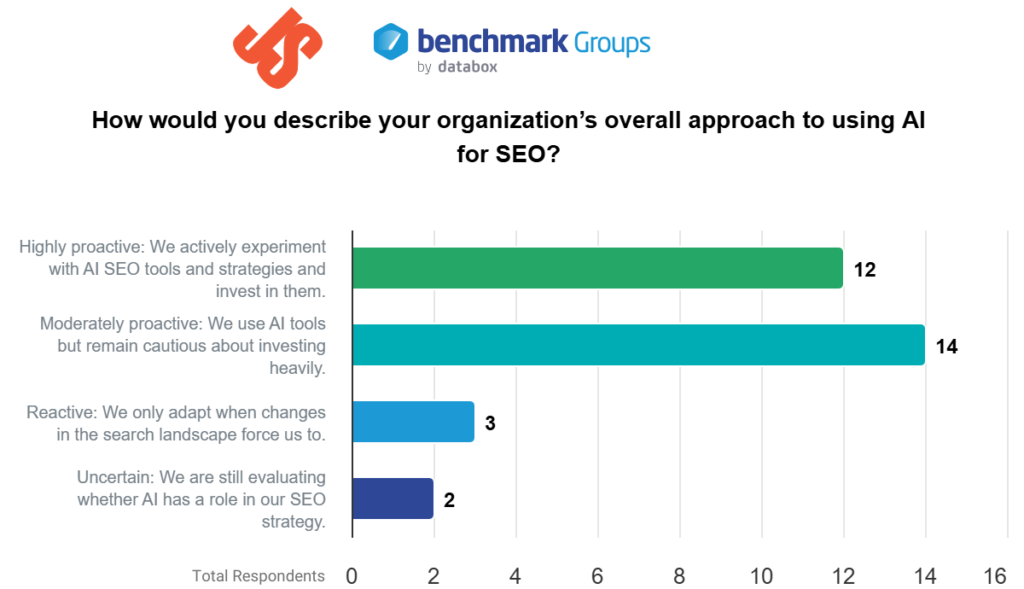
These results indicate that businesses taking a proactive approach to AI adoption are more likely to benefit from automation, data insights, and predictive SEO strategies. However, hesitant companies may struggle to keep pace with evolving search engine algorithms and AI-driven ranking factors.
Optimizing for the Future of AI & SEO
Our studies found that 23% of businesses already leverage AI for content personalization, highlighting the growing need to tailor digital experiences for individual users. As search behavior evolves, businesses must refine their SEO strategies to stay competitive in AI-driven search.
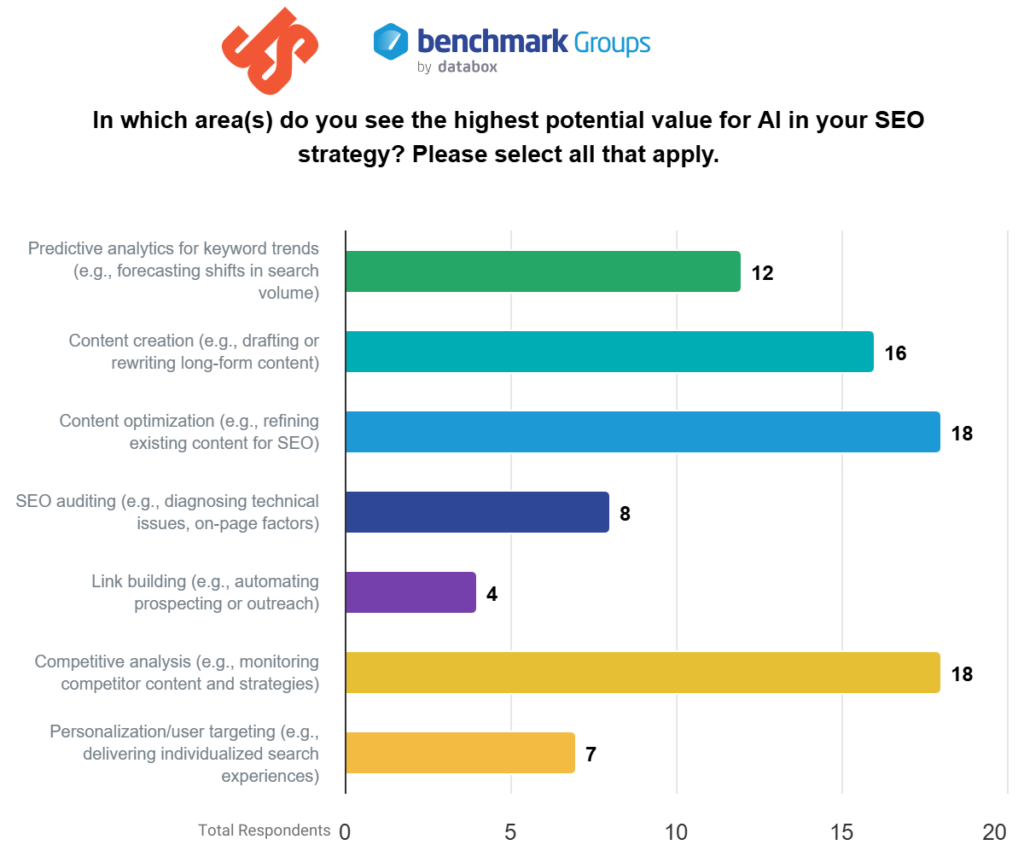
To achieve this, companies should:
- Implement structured data (Schema Markup) to help AI understand and rank content more effectively.
- Optimize for voice search and conversational AI queries as user behavior shifts toward natural language interactions.
- Enhance content personalization and user targeting to improve engagement and ensure content aligns with evolving search behaviors.
These approaches ensure content remains relevant and accessible in an AI-driven landscape, where personalization and structured data are pivotal to SEO success.
Is SEO in Demand in 2025?
SEO is not dead—it’s evolving. Businesses that adapt to AI-driven search and optimize for Generative Engine Optimization (GEO) will maintain a competitive edge. The key to success is staying proactive, integrating AI into SEO strategies, and focusing on high-quality, user-centric content.
To stay ahead in search rankings, businesses must embrace AI, refine their SEO strategies, and continuously optimize for the future of search.
Not sure where to start? Contact us to learn more about our SEO services.